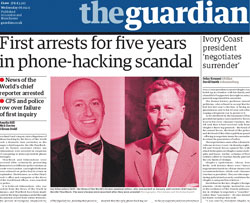Newspapers' scrutiny of each other can be good
It's tough being a newspaper owner. You are in a challenging industry going through huge change. Revenues are falling, readers are more demanding, and advertisers have many other options. You might have thought that owning media would give you influence and status but in fact, it often means difficult relations with politicians and others eager for a piece of that influence. Journalists are an unruly, individualistic lot who see it as part of their job to give media owners - and all of your friends and business partners - a hard time, even though they are on your payroll. On top of all this, your every move is likely to be reported in rival newspapers.
Irritatingly, these newspapers will say they are acting in the public interest while smirking at the discomfort they are causing their competition.
Like politicians, national sports coaches and rhinos, newspapers proprietors need big heads and thick skins. This was clear this week as the exchange between Sekunjalo Independent Newspapers and the Mail & Guardian erupted into a brawl, with both parties making bitter accusations. Both suggested the other was in financial difficulty, but it deteriorated into name-calling.
Personal, petty - but good
It might be unseemly, and it became personal and petty, but it is a good thing when newspapers apply to each other the scrutiny usually reserved for other industries and throw out the old gentleman's club agreements that traditionally held them back from reporting on each other.
British journalist Nick Davies broke these unwritten rules when he investigated and exposed in the Guardian his tabloid colleagues' phone hacking. He stepped in where the law had failed and forced a clean-up of British journalism, bringing an end to an era in which they all turned a blind eye to the appalling conduct of the tabloids and the dangerously close relationship between media boss Rupert Murdoch and many British politicians.
In doing so, Davies exposed the ugly underbelly while demonstrating the enormous social value of an independent, competitive media.
One expects newspapers to be paragons of the transparency and accountability they demand of others, but this is seldom the case. If our newspapers are aware that their rivals are paying attention to them, maybe they will work harder to meet the criteria for good governance their journalists expect of others.
A special product, in a special place
Private companies might own newspapers, but they are a special kind of product with a special place in our society - and owning them means taking on a kind of public trust and responsibility. They are sources of power and influence and need to be made publicly accountable for how they wield it.
Owners, editors, and journalists should not be crying foul when their colleagues and rivals subject them to close attention. This goes with the job.
There is another factor. Sekunjalo bought Independent Newspapers with a chunk of public money borrowed from the Public Investment Corporation (PIC). It paid a premium for a troubled company in a difficult industry - raising concern whether the pensions of ordinary people entrusted to the PIC were being used for political purposes.
This applies to other media groups as well. The PIC is also the largest investor in Naspers and Times Media Group - all the more reason to encourage journalists to watch closely.
Horrified
Talking of brawls, I am horrified at the abuse, harassment and even hate speech that is dominating social media discussion on the Israel-Palestine situation. The ease with which criticism of Israel can turn to anti-Semitism is terrifying, but as chilling is the onslaught by Jews on Jews who express even the mildest doubt about the wisdom of the occupation. Intolerant extremists on both sides are destroying the possibility for meaningful exchange on how to end the conflict.
It is a sad day when a tool designed for people to connect becomes another weapon.
About Anton Harber
- Find bright new ways to connect to readers - 31 Jul 2015
- Publish and be damned in name of patriotism - 24 Apr 2015
- Criminal libel has no place in law books - 20 Mar 2015
- One step forwards, one back for democracy - 2 Mar 2015
- Investment in people keeps news groups afloat - 13 Feb 2015
View my profile and articles...
